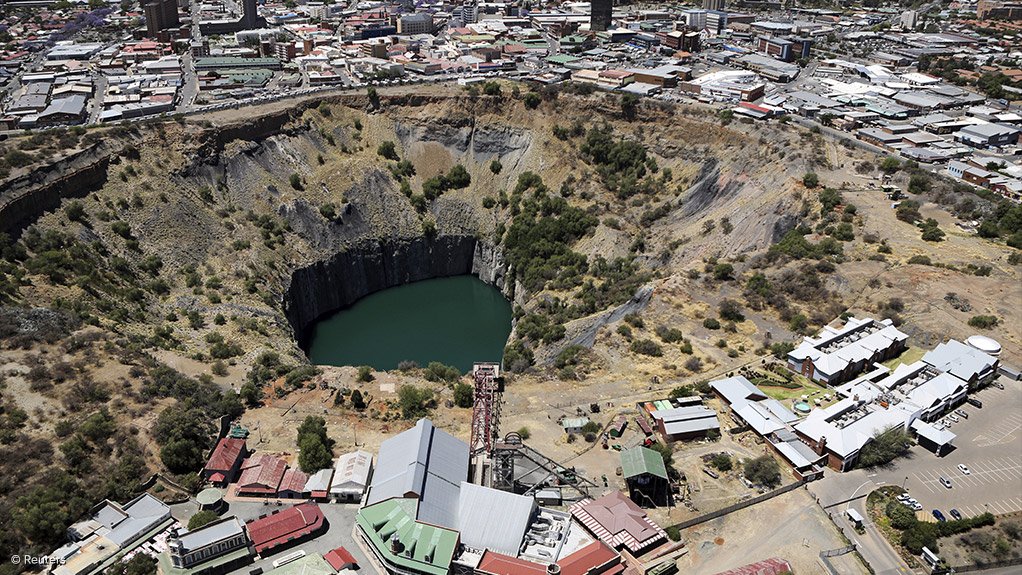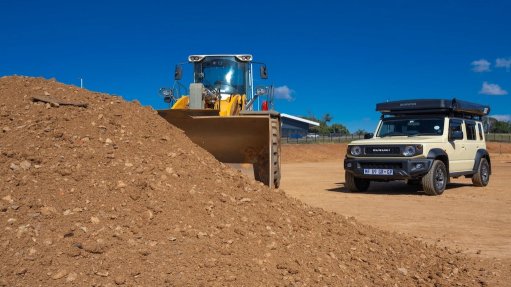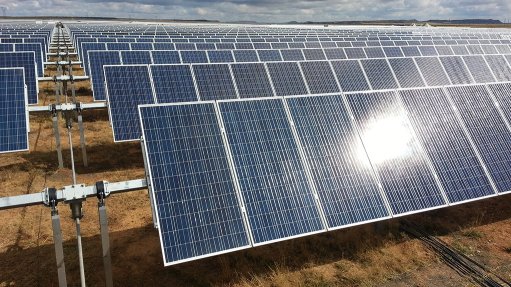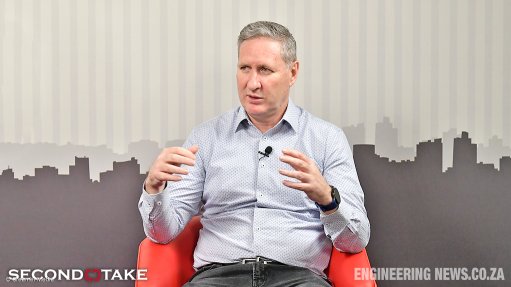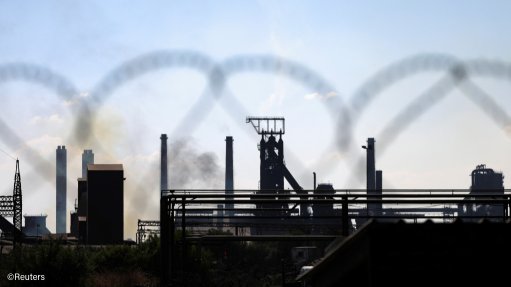In Kimberley, the world's diamond capital, illicit mining fight flounders
KIMBERLEY, South Africa (Reuters) – The first South African project to bring illegal miners into the formal fold has been plagued by violence in diamond capital Kimberley, dealing a major blow to national efforts to stem a booming illicit trade.
The project was launched 18 months ago in Kimberley, the site of a nineteenth-century diamond rush that lured fortune-seekers from the world over. Mine owners granted more than 800 unlicensed, or informal, small-scale miners the right to legally mine around 1 500 acres of diamond-rich waste fields.
The aim of the government-backed scheme was to curb illegal mining and black-market trade of diamonds, and serve as a blueprint for future attempts elsewhere in the country, not only in the diamond sector, but also potentially manganese, gold and chrome.
However the project has been hit by violence, with informal miners not included in the scheme attacking infrastructure and even members of the newly licensed cooperative, according to mine owner Ekapa Minerals which is running the initiative.
The failure thus far of this pilot scheme is a blow to wider corporate and governmental efforts to bring South Africa's estimated tens of thousands of informal miners, or "zama-zamas", into the mainstream, to boost productivity and curb crime.
Illicit mining and mineral trading cost around $1.5-billion a year in lost sales, taxes and royalties, according to a 2017 estimate by industry group, the Minerals Council South Africa, and sees criminal networks exploit vulnerable workers struggling to make ends meet.
While the government has always acted in an advisory capacity, it indicated it may now be forced to take a more active role in the project, the first to attempt so-called formalisation in the mining industry.
Asked whether he was pleased with the results of the Ekapa project, Mineral Resources and Energy Minister Gwede Mantashe told Reuters: "I'm not. We will have to assign somebody to work on it."
He did not elaborate on what would have to be done, adding only: "I am not happy because it (informal mining) must be in the mainstream of mining, it must not be in the periphery."
The project's troubles also demonstrate the perils of piecemeal formalisation in a country whose regulation of small-scale mining lags far behind its African counterparts.
'THEY COME WITH WEAPONS'
Ekapa and Petra Diamonds, then a part-owner of the mine, launched the initiative last year at Kimberley, in the Northern Cape province, hoping to address the problem of an influx of zama-zamas – a Zulu-derived word which loosely translates as "keep trying".
As much as R6-million worth of diamonds were being taken by illegal miners each month, Ekapa estimates.
In a bid to stem that, the company formed 836 miners into the Batho Pele mining cooperative and gave them a licence to mine the fields.
But a year and a half later, the track record on the ground is not promising.
Illegal miners who are not part of the cooperative have stolen fences, petrol-bombed three Ekapa trucks, blocked access roads with rocks and burning tyres, and sabotaged a waste pipeline, shutting down its plant, according to Ekapa.
Ekapa security teams have been attacked with knives, slingshots, rocks, petrol bombs and, in one instance, a hunting rifle, the company said.
Ramping up its defences against illegal miners drove Ekapa's security costs up to around R3-million before the project began, and the company is again beefing up security.
It has resorted to using alternative, longer routes for its trucks, adding up to a heavy financial burden on the company, said Ekapa Minerals CEO Jahn Hohne, in an interview at their Kimberley headquarters.
A police spokesman said its records show 22 criminal incidents linked to illegal mining across Ekapa's property and the area mined by Batho Pele between March and October this year, including an attempted murder and three serious assaults.
Members of the cooperative, who cannot afford formal security, say they are also a target.
"The problem that we are encountering now is from the other zama-zamas. They want to enter this thing with force," said Batho Pele member Victor Taku.
"They come here with weapons, others come here with firearms, others come here with a spade."
The 44-year-old dressed in orange overalls paid for his son's university fees with the money he made mining.
With joblessness at an 11-year high and the economy in distress, that income is out of reach for many South Africans.
DEARTH OF DATA
The Ekapa project's woes show the urgent need for the government to provide clear policy on small-scale or "artisanal" mining using rudimentary techniques, campaigners say.
In contrast with other African countries such as Mali, Democratic Republic of Congo, and Tanzania, South African law has no provisions for this.
"Our legislative framework is just missing in action when it comes to artisanal and small-scale mining," said David Perkins, an economist at Mining Dialogues 360, an NGO.
Efforts to bring illegal mining into the mainstream are also hindered by a lack of accurate data about how many are involved, what income they generate, and under what conditions they work.
"We have so many people that we don't even know where they come from. That is the challenge we are having," said Northern Cape police commissioner Lieutenant General Risimati Shivuri.
Pontsho Ledwaba, researcher at Wits University in Johannesburg, said there could be as many as 100 000 informal miners across South Africa.
To plug this data gap, the World Bank is pushing government to conduct a comprehensive study of artisanal mining, and may even fund it, two sources familiar with the matter told Reuters.
"Accurate, reliable data is an essential first step to understanding the sector, recognising miners and formalising their work," said a World Bank spokesperson. "While the World Bank is in continuing dialogue with the South African government, no study of the sector is planned at this time."
Even should formalisation projects like that at Kimberley ultimately prove successful, another question looms in the longer term: What happens to the small-scale miners when the resources run out, and where do they go?
The diamonds in the area of Kimberley mined by the cooperative, for example, are expected to run out in about five years.
"Our dream is that, when we give the land back to Ekapa, 90% of us will have something in our pockets," said 44-year-old miner Kagiso Nofomela, who hails from the town of Kuruman, about 145 miles away.
"We must have money, cars, homes and our kids must be educated."
Comments
Press Office
Announcements
What's On
Subscribe to improve your user experience...
Option 1 (equivalent of R125 a month):
Receive a weekly copy of Creamer Media's Engineering News & Mining Weekly magazine
(print copy for those in South Africa and e-magazine for those outside of South Africa)
Receive daily email newsletters
Access to full search results
Access archive of magazine back copies
Access to Projects in Progress
Access to ONE Research Report of your choice in PDF format
Option 2 (equivalent of R375 a month):
All benefits from Option 1
PLUS
Access to Creamer Media's Research Channel Africa for ALL Research Reports, in PDF format, on various industrial and mining sectors
including Electricity; Water; Energy Transition; Hydrogen; Roads, Rail and Ports; Coal; Gold; Platinum; Battery Metals; etc.
Already a subscriber?
Forgotten your password?
Receive weekly copy of Creamer Media's Engineering News & Mining Weekly magazine (print copy for those in South Africa and e-magazine for those outside of South Africa)
➕
Recieve daily email newsletters
➕
Access to full search results
➕
Access archive of magazine back copies
➕
Access to Projects in Progress
➕
Access to ONE Research Report of your choice in PDF format
RESEARCH CHANNEL AFRICA
R4500 (equivalent of R375 a month)
SUBSCRIBEAll benefits from Option 1
➕
Access to Creamer Media's Research Channel Africa for ALL Research Reports on various industrial and mining sectors, in PDF format, including on:
Electricity
➕
Water
➕
Energy Transition
➕
Hydrogen
➕
Roads, Rail and Ports
➕
Coal
➕
Gold
➕
Platinum
➕
Battery Metals
➕
etc.
Receive all benefits from Option 1 or Option 2 delivered to numerous people at your company
➕
Multiple User names and Passwords for simultaneous log-ins
➕
Intranet integration access to all in your organisation



